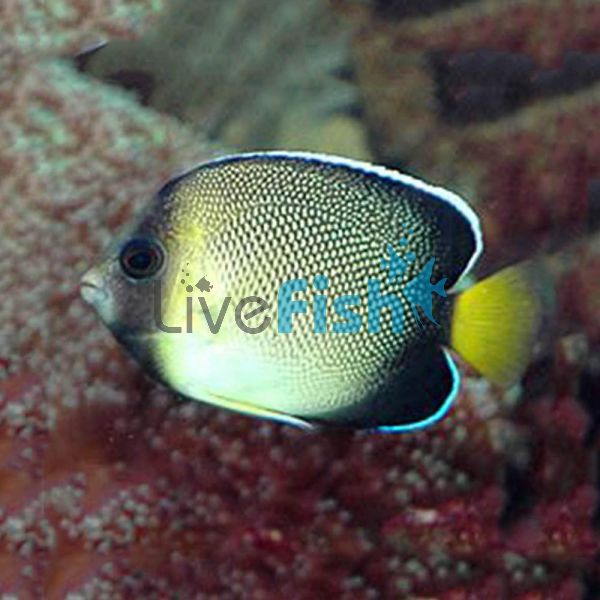Indian Yellowtail Angelfish - Small
The Indian Yellowtail Angelfish has a spotted appearance and is cream in colour. Its body is bordered by a broad dark margin. The face is dark brown, and it has black-tipped scales. The fins are white-edged, with a pale yellow tail fin. The juvenile is fairly similar to the adult, except that it is a little lighter and the body is less elongated.
Indian Yellowtail Angelfish
The Indian Yellowtail Angelfish has a spotted appearance and is cream in colour. Its body is bordered by a broad dark margin. The face is dark brown, and it has black-tipped scales. The fins are white-edged, with a pale yellow tail fin. The juvenile is fairly similar to the adult, except that it is a little lighter and the body is less elongated. Adults can reach a length of 6 inches (15 centimetres).
It is hermaphroditic, with no identifying characteristics that separate males from females. There are no reports of Indian Yellowtail Angelfish being bred in captivity. Angelfish are usually broadcast spawners. This means they release eggs and sperm at the same time at dusk. They perform a dance before rising into the water column. Then they release their eggs and sperm near the surface.
This species is native to the Indian ocean. It can be found in the Mascarene Islands, the Maldives, Sri Lanka, and India's eastern coast. It's also been spotted off the coasts of Thailand, and Myanmar as well as Sulawesi. It inhabits areas of coral and rocky reefs, between depths of 5-85 metres.
Tank Recommendations for the Indian Yellowtail Angelfish
Tank size for the Indian Yellowtail Angelfish is at least 75 gallons (284 litres).
Caution is advised in a reef setting as this fish may nip at corals. It needs plenty of live rock which it can graze on and use for hiding spaces. There should also be an area of open space for swimming.
They will become confident open swimmers. But will prefer to stay in the aquarium's middle or bottom areas.
Suitable Tank Buddies
The Indian Yellowtail Angelfish is a calm fish with a peaceful temperament. It thrives in a big community tank with fish of the same nature.
If housed in a tank that is too small, they may become aggressive toward their own species. This can also apply to other fish that are added after them.
Usually Compatible
Suitable tank buddies are peaceful fish such as Fairy Wrasses, Gobies, Assessors, & Dartfish.
Sometime Compatible
Conspecifics are only suitable as mated pairs in larger tanks. Semi aggressive fish such as Clownfish, Anthias, and Dwarf Angelfish will need monitoring.
Rarely Compatible
Larger semi-aggressive fish such as Tangs, Wrasses, and Large Angelfish are a threat. Aggressive species such as Damselfish and Dottybacks should also be avoided. Slow movers such as Seahorses and Pipefish are at risk from these Angelfish and need to be kept separately.
Feeding your Indian Yellowtail Angelfish
This species is an omnivore. It will eat plant & vegetable matter such as Spirulina, and marine algae. It will also consume meaty products like Mysis or frozen shrimp. High-quality angelfish preparations should also be included in the diet. Feed several times per day.
| Scientific Name | Apolemichthys xanthurus |
|---|---|
| Care Level | Moderate |
| Common Names | Indian Yellowtail Angelfish, Cream Angelfish, Yellowtail Black Angelfish, Cream Angelfish, Smoke Angelfish, Yellowtail Angelfish, Xanthurus Cream Angelfish, Xanthurus Angelfish, and Indian Yellowtail Pygmy Angel. |
| Diet | Omnivore |
| Fish Family | Pomacanthidae |
| Lifespan (years) | 10 |
| Max. Length (cm) | 15 |
| Min. Tank Volume (l) | 480 Liters |
| Origin | Indian ocean; Mascarene Islands, Maldives, Sri Lanka, Thailand, Myanmar, Sulawesi |
| Reef Safe | With Caution |
| Sociability | Semi-aggressive |
| Venomous | No |
| Water Conditions | 22-27° C, dKH 8-12, pH 8.0-8.4, sg 1.023-1.025 |




